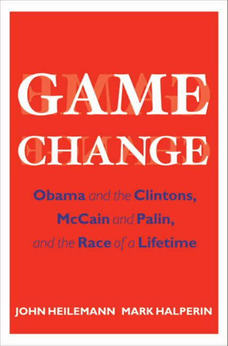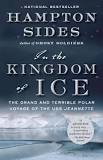|
In my book, The God Con, I briefly discuss one of the more famous cons of WWII called Operation Mincemeat. It was a diversion to make the Germans think the first landing on European soil would be in Greece, rather than Sicily (not D-Day as I wrote).
0 Comments
 I generally do not read political books. This one is about the election of Obama. I think I primarily read it because of the movie of the same name. The movie was pretty much all about Palin. The book actually spends very little time on Palin. Nevertheless, I read it through. Which means I was engaged. The major take away for me was the campaign of Hillary Clinton, which echoed the most recent one. Over confidence. Blame others. A sense of entitlement. She felt Obama was an ungrateful line-jumper who should wait his turn. She spoke of Obama's "insufferable arrogance" and moaned about the media fawning all over him. The Clinton 2008 campaign was relatively polite until near the end, when Bill waded in. Bill,probably unintentionally, raised race as an issue. The book covers the sad run of John Edwards, who cheated on his cancer struck wife. John Edwards was a cad, and it turns out his wife was a bitch. He impregnated Hunter, the "other woman", who was a bit unhinged ("I'm a witch!). The first half of the book covers Obama, the second, McCain and Palin. There is as much meat in the movie as the book on the McCain run. I see the authors regularly on TV and the book is still mentioned today. If you are a political junkie, just interested on the election of the first black president, or would like to compare the most recent campaign in which the US elected an asshole, to the one eight years ago, I think you will find this book informative. October the 4th came and went with hardly a whimper. I note this not because October 4th is my birthday, but because October 4th 2017 is the 60th anniversary of the Space Age. On that date, in 1957, the Soviets launched Sputnik.
Sixty years before that, in 1897, powered, manned flight was still a dream, but a dream only 6 years away from reality. In 1903, the Wright Brothers flew an airplane for the first time in history. A lot happened in the next 60 years, fueled greatly by two world wars. In 1964, 61 years after the Wright Brothers flew, the Americans launched the SR-71 Blackbird spy plane. That airplane still holds most of the records for powered, manned, air-breathing flight. In just three generations, humanity had conquered the air. The only thing that stands in the way of pushing the flight envelope further is the fragile pilot. That was the Age of Flight, done and dusted. The Space Age is now only 60 years old, but the records it has set will stand for centuries… and for some, forever. For those of you who were not privileged to live through these years, here are some highlights:
During the next 50 years, there were robot missions to Mercury (Mariner), Venus (Magellan), Mars (too many to list), Jupiter (Pioneer, Voyager, Cassini, Gallileo), Saturn (Voyager, Pioneer, Cassini), Uranus and Neptune (Voyager) and Pluto (New Horizons). 2017 was a hell of a year. The Cassini mission to Saturn wrapped up, and New Horizons gave us our first close-ups of Pluto, Enough data to keep planetary astronomers busy for quite some time. We have left the solar system entirely (Voyager). We have landed on a comet (Rosetta). We have even landed a probe on Titan (Huygens), the only other place in the solar system that has rain (liquid methane, actually… Titan is a bit nippy). Man will walk on Mars someday. After that, it may be centuries before man walks on another world, largely because robots will go there for us. Will we ever see another new world close up. Effectively no. In my lifetime, we have seen all the major sites and visited all the main tourist attractions in the Solar System. There is a wealth of new information which we will gather over the coming decades, but it will all be about things we have seen before. Aside: The Kuiper Belt contains several new dwarf planets and it is possible that probes might be sent to one or more. However, it seems to me unlikely. They would be expensive and I suspect there are better ways to spend the exploratory dollar. The next new planet we see will not orbit our Sun. The closest extrasolar planet we know of is about ten light years away, and there is little reason to want to look at it in particular. But say we did want a close-up look. Ten light-years is a long way away. 50 trillion miles away. If we built a probe that could get there and send us back snaps, it would be a huge undertaking with little guarantee of success. If that probe could be accelerated to, say, 1% of the speed of light (about 7 million mph!), we would not expect to get a photo back for 1,010 years. Civilizations rise and fall in much less time. I should tip my hat to computing here. Apollo 11 had an on-board computer that was way less powerful than a modern wrist watch. Since then, computing power has exploded like no other technology in history. Hitting Pluto without computers, both on the ground and on-board the probe, would not have been possible. Computing is having a similar effect on most of the hard sciences So we are lucky. No other generation in the foreseeable future will ever see the surface of a new world. We have seen dozens and dozens (I am counting moons). We have images of Saturn’s rings, backlit by the sun (totally awesome). We have walked on another world, and seen every world in our solar system, in just 60 years. When I was a kid, all this was abstraction. The images produced by Cassini are of the kind that makes your spirits soar. We are the luckiest generation!  Some months ago I read The Lost City of Z (see my comments elsewhere on this site). That book was about turn-of-the-century (circa 1900) explorers going to the bowels of the Amazon jungle in search of a lost city, reputed as all lost cities are, to be filled with gold. The journey took years to complete. People died and those who didn't were subject to disease, parasites, starvation, angry natives and so on. In the Kingdom of Ice is about a similar trip circa 1880. George De Long was bitten by the Arctic bug. He had been there once before and wanted to go again to search for a reputed north pole warm sea surrounded by ice. There was not a lick of evidence for this. There were questions about certain warm water currents that were unanswered, and it was thought that a warm sea at the north pole would answer them. The speculations in this regard were very close to science fiction. But truth be told, glory was a goal in and of itself in those days. And glory can translate to power and wealth. The ship Jeannette was well equipped by a newspaper baron and sailed on July 8th, 1879 for the Bering Straight in hope of find the warm sea. The steam-ship passed the Bering straight, and promptly got itself locked into the ice. The story of there next years on the ice is similar to that of The Lost City of Z. When the ice finally broke during the following summer, instead of freeing the Jeannette, it sank it. The 30+ men did what they had to do, short of cannibalism, to survive. No parasites, but plenty of disease, and of course, frost bite and gangrene. Try to imagine weeks in an open boat with 10 others. The boat is 20 feet long, being tossed about in gale force winds, only 15 degrees off the north pole. And during all of that time, you are bailing for your very life. Not everyone made it. And virtually nothing was accomplished. It is hard to put ones mind into that of an 1800 explorer. I imagine that those types of people are today's base jumpers. The writing is excellent. The glimpse into life on the ice, and onboard a ship stuck in the ice, is gripping. I would not last one week in that world. The whole story is true, but it reads like a novel. The God Con is all about the parallels between religion and the con. As I discuss in the book, many of the techniques of magic and deception are used to promote both.
In his book Breaking the Spell, Daniel Dennett describes religion’s version of this “trick”: If someone raises concerns or issues about your religion, then that someone is likely Satan. In fact, the more sincere, reasonable, open-minded, and friendly that someone appears to be, the more likely they are, in fact, Satan. This is mind-bogglingly stupid—a trick that would make a five year old scratch his head—but it works. It has kept religion alive for thousands of years. This technique can be used to defend any and all kinds of beliefs and ideas, All you need is an adversary to your belief. The “con game” version of this is if that someone is trying to tell you Bernie Madoff is a crook, he is probably a cop. If you are a Communist, beware the evil FBI agent passing himself off as your friend… and so on. Scientology uses this ploy extensively. A modern day version of this is Donald Trump. If you challenge him on anything, you are a member of, or a dupe of, “fake news”. Unlike Satan, “fake news” is real, and a lot of it comes out of the Donald’s mouth. Other examples of fake news are infomercials, political ads and advertisements disguised as actual reporting. Donald Trump has a lot in common with Bernie Madoff and just about every religious leader on the planet. He is a fake and a con artist. The sad thing is that this transparent trick still seems to be working. |
AuthorLee Moller is a life-long skeptic and atheist and the author of The God Con. Archives
May 2024
Categories
All
|

 RSS Feed
RSS Feed